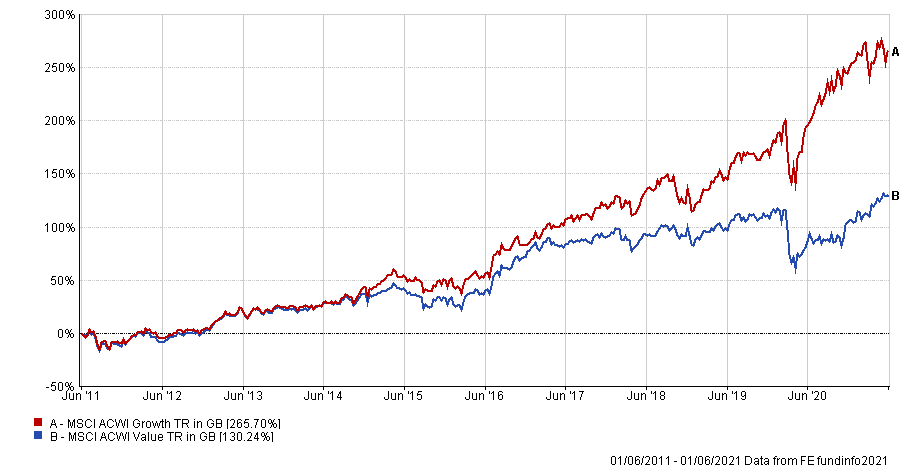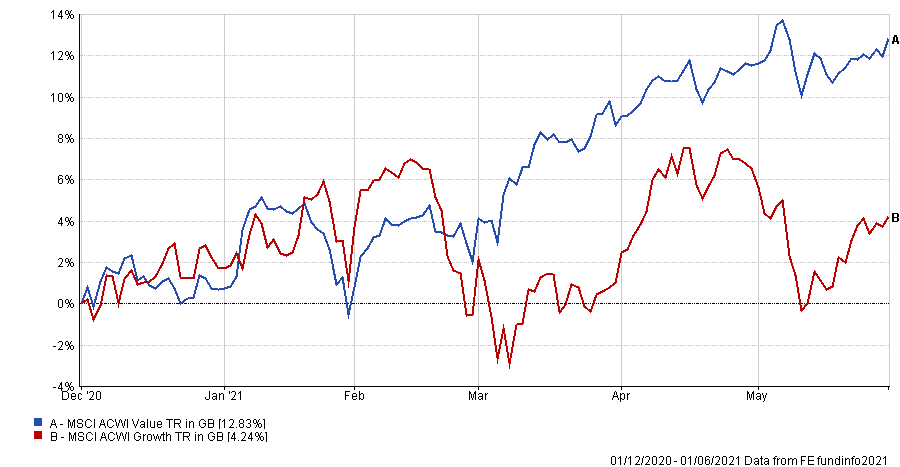Markets have been led by growth stocks for the past decade with US names in particular spearheading this trend but the tables could be flipped for the next decade, according to Vanguard senior investment strategist Kevin DiCiurcio.
DiCiurcio thinks that US value stocks will outperform US growth over the next 10 years.
The significant outperformance of growth versus value over the past decade is a well known market event, especially noticeable of US tech stocks.
Below shows the performance of the MSCI ACWI Value and MSCI ACWI Growth indices over the past 10 years, where growth’s outperformance is clearly evident.
Performance of MSCI ACWI Value vs MSCI ACWI Growth over the past 10yrs

Source: FE Analytics
According to Vanguard’s research, US growth stocks have outperformed is value peers by an average of 7.8 per cent per year.
But DiCiurcio think that “brighter days” are ahead for US value stocks. “This might seem a relatively safe prediction,” he added, given the outperformance of value stocks so far this year.
Over the past six months markets have moved into a recovery phase as economies and countries emerge from Covid-19 lockdowns.
This environment is favourable to cyclical assets such as commodities, energy and oil which typically perform better in times of stronger economic growth and inflation. It’s also a challenging environment for assets more sensitive to interest rate rises, another factor investors are looking at as inflation fears pick up.
Performance of MSCI ACWI Value vs MSCI ACWI Growth over the past six months

Source: FE Analytics
“The coming reversal of fortunes would restore the decades-long performance edge that academic researchers have ascribed to value stocks,” DiCiurcio said, as the “eyewatering” underperformance of value over the past decade is atypical of financial market history.
Younger investors might be especially sceptical of a substantial shift into value, DiCiurcio said, as they’ve seen technology share prices continuous rise and only really experienced growth stocks leading markets.
But the Vanguard strategist said there are several reasons why value will lead the US market for the next decade.
“To better understand past results and provide estimates of future returns, we identified fundamental forces – some secular, others cyclical – that drive changes in the value-growth relationship and constructed a related fair-value model,” he said.
According to this, the reason value stocks have underperformed in recent years is mainly down to “fundamental drivers, particularly low inflation rates, which boost the relative attractiveness of growth stocks’ more-distant cash flows”. But investor behaviour has played a role as well.
“We expect US value stocks to outperform US growth over the next 10 years by four to six percentage points, annualised, for a UK investor, and perhaps by an even wider margin over the next five years,” DiCiurcio said.
“To be clear, our outlook is for the style factors, or what might be termed ‘pure’ value and growth portfolios.”
Another reason why DiCiurcio expects value to succeed growth’s performance is that the “growth trade is overdone”.
The narrative of growth stocks’ outperformance has been in tangent with growing criticisms of the valuation of certain companies.
Conducting its own research on the relationship between fair-value deviations and future results, Vanguard observed that valuations are not a confirmation of future results.
“The relationship is an affirmation that, ultimately, valuations matter – the price we pay influences our return. That’s intuitive, right? So, too, is the imperfection of our model: While it reveals a relationship between fair-value deviations and future results, its predictions for relative performance are imprecise. That’s consistent with investment risk enabling but not guaranteeing potential returns,” DiCiurcio said.
Ultimately, if valuations gave an accurate picture of future returns “there’d be no risk,” he said. “Fortunately, that’s not how markets work.”
Taking this one step further, DiCiurcio explained that the large current deviation of growth stock valuations relative to Vanguard’s fair-value estimates is similar to what markets saw at the height of the dotcom bubble. Essentially ,they’re becoming as overpriced as they were when the bubble popped.
“When the bubble popped, value proceeded to outperform growth by 16 per cent, annualised, over the next five years,” the strategist said.
He added that there’s no absolute certainty that growth stocks are currently in a bubble.
But he added: “We believe that cyclical value-growth rotations are rooted in investor behaviour and that investors become more price-conscious when profit growth is abundant. Since 2008, corporate profit growth has been insufficient to sustain value stocks.
“Vanguard expects inflation to normalise and eventually exceed the Federal Reserve’s 2 per cent target this year and next. Corporate profits should strengthen amid economic recovery from the pandemic. Still, their impact on the ‘fair value of value’ may be modest. The ultimate driver of the coming rotation to value stocks, then, is apt to be a change in investors’ appetite for risk.”
He concluded: “Investors who maintain a portfolio diversified across sectors and styles can expect value’s outperformance to be a cushion against possible negative returns in the growth portion. In that sense, they would be advised to stay the course.”





